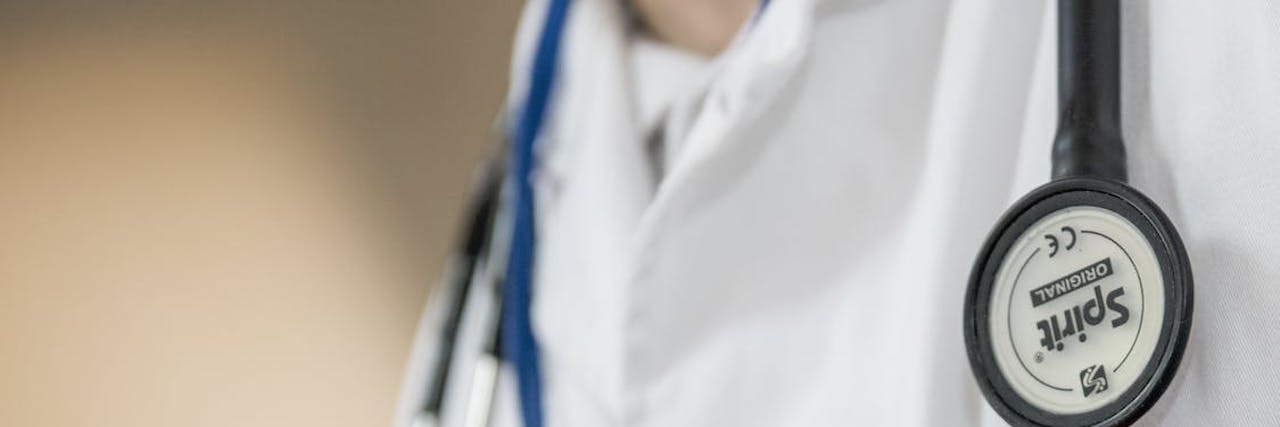I'm Allergic to Touch, and No One Believes Me
“I don’t believe in that.”
It was the first time I heard it, and it threw me. I sat in the gastroenterologist’s office, hands in my lap, as he explained to me that aside from a little inflammation, there was nothing physically wrong with my intestines.
I had just suggested, in my limited, 19-year-old medical vocabulary, that perhaps I had something like SIBO (small intestinal bacterial overgrowth). I knew full well I ate a relatively healthy diet, that the occasional pizza wasn’t the reason I was getting sick after every meal. But he brushed it off. Maybe, he speculated, I was lactose intolerant.
I left the office, passing a waiting area and a fountain. I vomited into my mouth quietly, barely noticing because I had become so accustomed to it. I ran through the appointment in my mind. Nothing wrong. Eat healthier. Blood test results normal. Lactose intolerant. I don’t believe in that. I don’t believe in that.
It was six months until I took matters in my own hands. By process of elimination, I began removing common allergens from my diet, and reintroducing them one by one.
I was not lactose intolerant. I was having extreme, multi-system reactions to almost every staple in my diet. Soy, corn, wheat and yes, dairy. And I wasn’t just reacting to eating those foods, I was reacting to touching them – more specifically, to touching other people who had minuscule amounts of food on their hands.
I went to an allergist next. I laid on my stomach during the skin test, burping and throwing up into my mouth because tiny amounts of dairy, soy and wheat had been pricked into my back. But while the allergist and the nurse both showed great concern for how visibly ill I was becoming, the test results were negative. I had “true allergies” to grass and dust mites and pollen – but not to any of the things I’d identified as making me so ill.
I expressed my frustration to the allergist, explaining I was reacting to tiny amounts of specific foods, regardless of the skin test results. “I can’t help you with that,” he said. “You should see a gastroenterologist.”
It’s been four years since I started to get sick. Three years since I discovered I was reacting to foods. Two years since I shook hands with someone holding a coffee, and realized 10 minutes later I had become allergic to human touch.
“I can’t shake hands because of my chronic illness,” I tell people. “It’s nice to meet you, though.” There hasn’t been a single time the other person hasn’t been thrown. When people ask me to explain, I see the same incredulity in their eyes as I’ve seen in the eyes of so many medical professionals. I don’t believe in that.
At first, even my partner wondered if it might be psychological. Maybe I was having anxiety about contacting or ingesting the foods, and that was manifesting in physical symptoms. We were in a long distance relationship, so eating together wasn’t a regular occurrence. But after the first time they watched me fall ill because they had eaten dairy and then kissed me, they didn’t wonder anymore. They didn’t have to; they were close enough to see it.
I’ve never had a choice but to believe in it. My body is living proof. A speck of my housemate’s spit hit my face as she laughed, and I spent the rest of the day in bed, sick to my stomach, brain fog so thick I could barely form sentences. A radiologist touched my face rather than simply asking me to move my head to the right, and my partner had to steer me home by the arm because I was so dizzy and confused.
While those close to me believe me and support me — wash their hands with corn-free soap when they come to my house, hug me over my clothes, don’t complain that we can’t go out for lunch — outside of my inner circle, particularly in medical settings, I have been met overwhelmingly with skepticism. When modern medicine does not have a name for your experience, most people assume the problem is you, not the lack of research into rare and chronic illness.
It’s not just an issue because I’m sick and there’s no definite reason why, no treatment, no solution. It’s an issue because having my experience invalidated in medical settings legitimizes its invalidation in all settings. It’s an issue because when people disbelieve me, they often go on to do things which I’ve just told them will make me sick. A family member once gave me vegetables covered in butter and told me they were plain. They assumed it was all in my head – that if I didn’t know the butter was there, I wouldn’t get sick from it.
How many days should I have to spend unwell and in pain to prove to the world I’m not making it up? What if I shake someone’s hand before my next gastroenterologist appointment, and vomit onto the floor instead of choking it down? Would I be believed then?
Or would I just be told I’m lactose intolerant?
This post originally appeared on Medium.
We want to hear your story. Become a Mighty contributor here.

